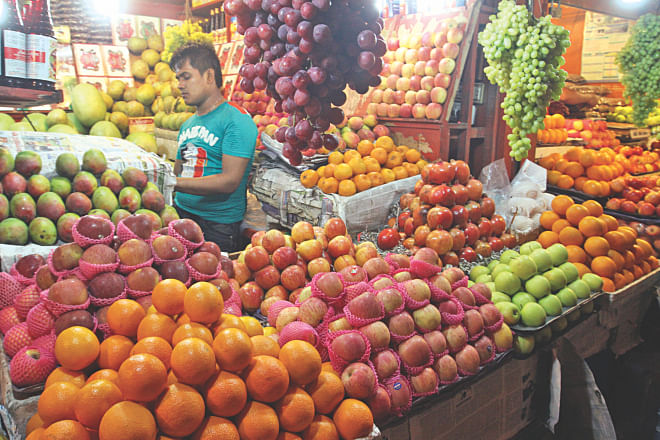Food safety in Bangladesh

Lead in turmeric; formalin in fruit; fatal food poisoning after eating watermelon. Recent findings released by the Ministry of Health's National Food Safety Laboratory—of high residues of banned pesticides, and chemical preservatives in fresh produce samples from local markets in Dhaka—confirm the widely held suspicion that food control in Bangladesh is inadequate.
The results suggest that farmers are using a cocktail of toxic chemicals in their efforts to fight insect pests - and that they are not sufficiently aware of the need to stop using them before harvesting. The results also indicate deliberate adulteration of produce to extend its shelf life, using chemical preservatives without concern for the health of consumers. Other results have previously highlighted contamination by microorganisms, leading to acute food poisoning cases in consumption of fruit, occasionally with tragic consequences.
The press is commended for drawing attention to such cases, but the question is what can be done to prevent them happening? And it is not sufficient just to tell consumers to be more careful, or to avoid buying mangoes from certain vendors!
I would argue that there are a number of things which are needed, some of which are already in hand. But the first thing to do is to recognise that the problem has at least three different dimensions – which I would characterise as the “production practices” question, the “fraud” question, and the “food handling” question.
With regard to production practices, the way forward is to educate farmers in using agro-chemicals and to move towards less toxic alternatives (recognising that the farmers will look for the most convenient or cheapest means of controlling pest or disease). This should start in the major fruit and vegetable producing areas, such as Jessore or Comilla. More work is needed to understand what advice farmers are being given; what chemicals they are using; where they are getting them. There may also be initiatives to control the availability of toxic pesticides which are banned but are still produced in neighbouring countries; there may still be stockpiles of such chemicals in Bangladesh which need to be disposed of safely
Regarding the fraud question, what we are talking about is the adulteration of food to make it appear fresher than it is, in ways which actually make the produce unsafe. Inspection and prosecution are a key element in consumer protection. Injecting formalin is not (ever) a safe practice even if it makes fruits look better for longer. Those who do so should fear the consequences if they are caught doing so. Here, transparency is vital. Eventually consumers will avoid suppliers with a poor track record. Labelling and packaging to improve traceability are also important to maintain the integrity of the food chain. Other countries face the same problem of criminal adulteration – in China, the apparently deliberate use of melamine in dried milk to boost the fat content was a recent case with serious food safety consequences; in Europe criminal gangs are substituting cheap replacements for high value commodities such as olive oil. Lessons may be learnt from others in how to combat such food-based frauds.
Finally on the food handling question, contamination occurs from use of unclean water, or other unsanitary practices, the inability to maintain a cold chain, cross contamination between different food products. Again education is part of the solution; but also investment in food handling infrastructure (cold chain, processing, packaging, market infrastructure).
If people want safer food, they may have to pay more for it. Paying more is not a guarantee of safety in itself. And for many in Bangladesh, paying more is not an option.
What to do? Several government departments have a role to play in consumer protection, whether by educating the producers to produce safer food, by testing samples, by prosecuting cases where unsafe food is being sold. The Bangladesh Food Safety Authority incorporated in the 2013 Act is a major step in the right direction, to help coordinate consumer protection activities across the food control system. FAO is providing technical assistance to the Ministry of Food on setting up the authority. But this also requires the political will across government to support the authority in its infancy, and the commitment to devote sufficient public resources to make it operational in the longer term.
The writer is the Bangladesh representative of the Food and Agriculture Organisation.

 For all latest news, follow The Daily Star's Google News channel.
For all latest news, follow The Daily Star's Google News channel. 



Comments